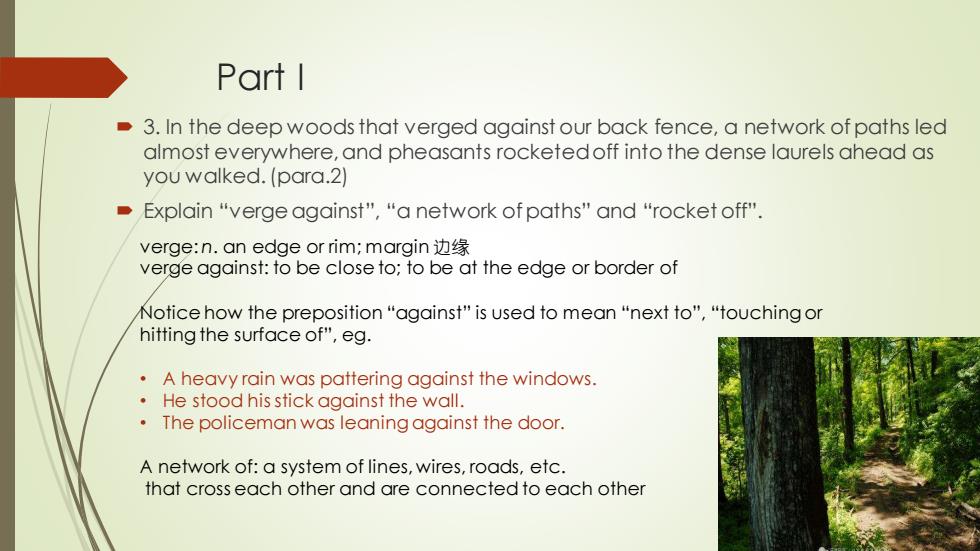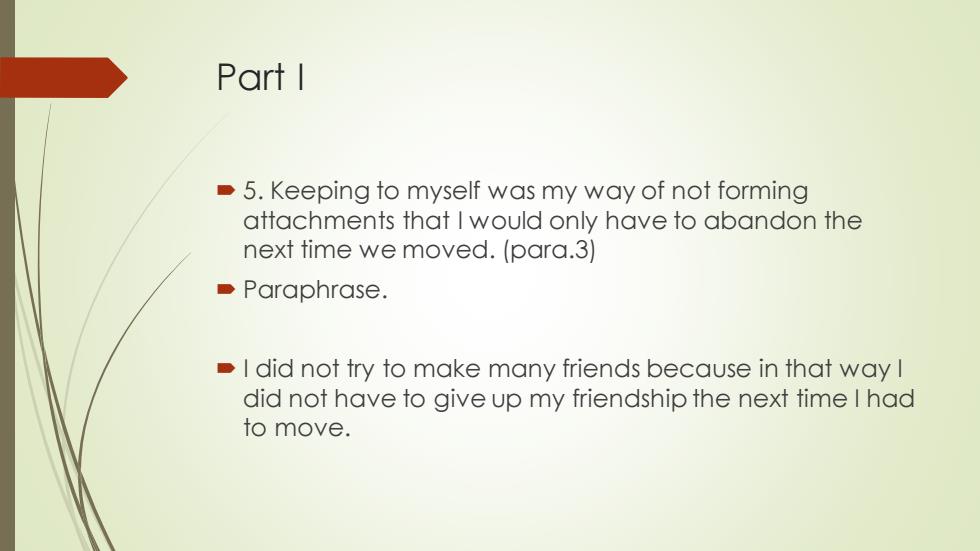
Part I3.Inthedeepwoodsthatvergedagainstourbackfence,anetworkofpathsledalmosteverywhere,andpheasantsrocketedoffintothedenselaurelsaheadasyouwalked.(para.2)Explain"vergeagainst","anetwork ofpaths"and"rocketoff"verge:n.anedgeorrim;margin边缘vergeagainst:tobecloseto;tobeattheedge orborderofNoticehowthepreposition"against"is usedtomean"nextto","touchingorhittingthesurfaceof",eg.Aheavyrainwaspatteringagainstthewindows.Hestoodhisstickagainstthewall.Thepolicemanwasleaningagainstthedoor.Anetwork of:asystemof lines,wires,roads,etc.thatcrosseachotherandareconnectedtoeachother
Part I 3. In the deep woods that verged against our back fence, a network of paths led almost everywhere, and pheasants rocketed off into the dense laurels ahead as you walked. (para.2) Explain “verge against”, “a network of paths” and “rocket off”. verge: n. an edge or rim; margin 边缘 verge against: to be close to; to be at the edge or border of Notice how the preposition “against” is used to mean “next to”, “touching or hitting the surface of”, eg. • A heavy rain was pattering against the windows. • He stood his stick against the wall. • The policeman was leaning against the door. A network of: a system of lines, wires, roads, etc. that cross each other and are connected to each other

Part I3.Inthedeepwoodsthatvergedagainstourbackfence,anetworkofpathsledalmosteverywhere,andpheasantsrocketedoffintothedenselaurelsaheadasyouwalked.(para.2)Explain"vergeagainst","anetworkofpaths"and"rocketoff"rocketoff:(pheasants)tookofflikerocketsCompare:FdctoriesmushroomedHetriedto wormintothatorganization.ItcouldsnowballintoaseriousconflictHewaswolfingitdownasifhehadnoteatenfordays.Analyzestructureofthesentenceandtranslateit我家后院篱芭外有一大片树林。树林深处的小路四通八达。当你向林中走去时,不时有雉鸡突然跃起,钻进密密的月桂树丛里
Part I 3. In the deep woods that verged against our back fence, a network of paths led almost everywhere, and pheasants rocketed off into the dense laurels ahead as you walked. (para.2) Explain “verge against”, “a network of paths” and “rocket off”. Analyze structure of the sentence and translate it. rocket off: (pheasants) took off like rockets Compare: Factories mushroomed. He tried to worm into that organization. It could snowball into a serious conflict. He was wolfingit down as if he had not eaten for days. 我家后院篱笆外有一大片树林。树林深处的小路四通八达。当你向林中走去时,不时有雉鸡突然 跃起,钻进密密的月桂树丛里

Part I4.Ispentmostofmytimeroamingthewoodsandfieldsalone,playingRobinHood,daydreaming,collectingbugsandbird-watching.(para.3)Lookup“roam"inthedictionary.Compareitwith"roamabout"inpara.4and"walk"inpara.17roam:normallyanintransitiveverb,towalkortravelandusu.withoutanyclearpurpose,eg.roamabouthisimmensepropertyroamfreelyonthelandSimilarly,"walkthefield"isanidiomaticuseof"walk"Othercommonexpressionsinwhich"walk"isusedasatransitiveverb:HewalkshisdogtwiceadayTherearenomorebusesatthishour.Let'swalkit.It'sdarkoutside.l'llwalkyouhome.Explain"playingRobinHood
Part I 4. I spent most of my time roaming the woods and fields alone, playing Robin Hood, daydreaming, collecting bugs and bird-watching. (para.3) Look up “roam” in the dictionary. Compare it with “roam about” in para.4 and “walk” in para.17. Explain “playing Robin Hood”. roam: normally an intransitive verb, to walk or travel and usu. without any clear purpose, eg. roam about his immense property, roam freely on the land Similarly, “walk the field” is an idiomatic use of “walk”. Other common expressions in which “walk” is used as a transitive verb: • He walks his dog twice a day. • There are no more buses at this hour. Let’s walk it. • It’s dark outside. I’ll walk you home

Part I4.Ispentmostofmytimeroamingthewoodsandfieldsalone,playingRobinHood,daydreaming,collectingbugsandbird-watching.(para.3)Lookup"roam"inthedictionary.Compareitwith"roamabout"inpara.4and"walk"inpara.17Explain"playingRobinHood"IfmeanspretendingtobeRobinHoodhereRobinHoodisthenameofalegendaryEnglishoutlawofthe12centuryheroofmanyballads,whorobbedtherichtogivetothepoor.HelivedandpresidedoverhisbandoffollowersinSherwoodForest.Hewasbelievedtobeaperfectmodelofcourage,generosityand justice,as wellasofskillinarchery.Thestoriesabout Robin Hoodandhis"merrymen"are similarin theirpopularitytothestoriesof the1o8famousoutlawsintheChineseclasnovelWaterMargin
Part I 4. I spent most of my time roaming the woods and fields alone, playing Robin Hood, daydreaming, collecting bugs and bird-watching. (para.3) Look up “roam” in the dictionary. Compare it with “roam about” in para.4 and “walk” in para.17. Explain “playing Robin Hood”. ➢ It means pretending to be Robin Hood here. ➢ Robin Hood is the name of a legendary English outlaw of the 12 century, hero of many ballads, who robbed the rich to give to the poor. He lived and presided over his band of followers in Sherwood Forest. He was believed to be a perfect model of courage, generosity and justice, as well as of skill in archery. ➢ The stories about Robin Hood and his “merry men” are similar in their popularity to the stories of the 108 famous outlaws in the Chinese classic novel Water Margin

Part I5.Keepingto myself was my wayofnot formingattachmentsthatIwouldonlyhaveto abandonthenexttimewemoved.(para.3)Paraphrase.I didnottrytomakemanyfriendsbecauseinthatwayldidnothaveto giveup myfriendshipthe next time Ihadtomove
Part I 5. Keeping to myself was my way of not forming attachments that I would only have to abandon the next time we moved. (para.3) Paraphrase. I did not try to make many friends because in that way I did not have to give up my friendship the next time I had to move